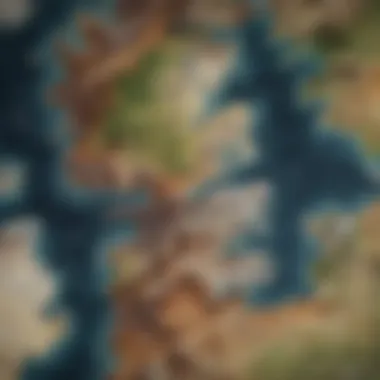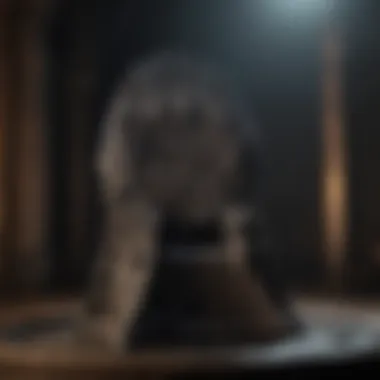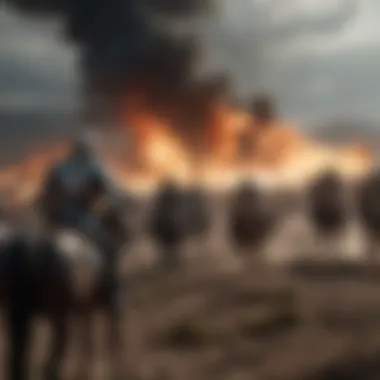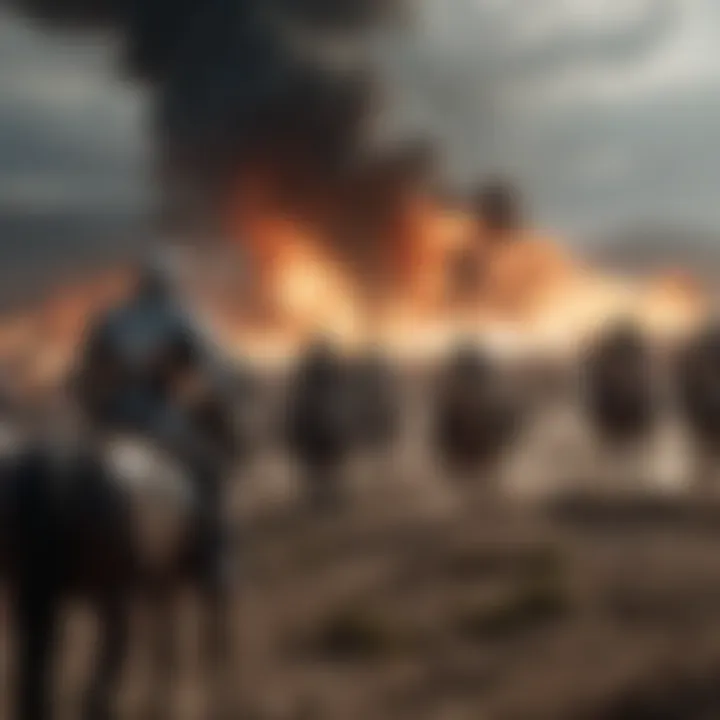Exploring the Depths of the Game of Thrones Universe


Intro
The Game of Thrones universe has captivated millions around the globe. This intricate world is rich with political intrigue, complex characters, and moral dilemmas that challenge viewers. By exploring this universe, one can uncover layers of storytelling that go beyond simple entertainment. A deeper understanding of the show's themes will highlight why it has become a cultural phenomenon.
Character Dissections
Detailed analysis of key characters in Game of Thrones
Game of Thrones features a diverse array of characters, each with unique traits and motivations. Eddard Stark, for instance, embodies honor and duty, which tragically leads to his downfall. In contrast, Cersei Lannister personifies ambition and cunning, manipulating events to maintain power. This juxtaposition creates a rich tapestry of character interactions.
Character development throughout the series
Throughout the series, characters evolve considerably. Daenerys Targaryen transforms from a timid girl into a powerful leader, driven by her desire to reclaim her family's throne. Conversely, Jon Snow grapples with his identity, from being a perceived illegitimate son to becoming the potential savior of humanity. These developments illustrate the complexity of human nature and the changing landscape of power.
Impact on the overarching storyline
Each character’s journey significantly impacts the overarching narrative. The decisions made by Tyrion Lannister often sway pivotal moments in the war for the Iron Throne. The interplay between various character arcs weaves a complex web that drives the story forward. Their triumphs and failures resonate with the audience, amplifying the stakes involved.
Episode Breakdowns
Recap of significant events in each episode
The series consists of several episodes, each packed with significant developments. For instance, the infamous Battle of the Bastards episode showcases not just a clash of warriors but also highlights personal vendettas. Each episode contributes to the larger narrative, serving as stepping stones.
Exploration of themes and symbolism
Themes such as power, betrayal, and family are prevalent throughout the show. The symbolism in certain scenes, such as the Iron Throne representing the corrupting influence of power, deepens viewers’ understanding. The show does not shy away from illustrating that power often comes at a steep cost.
Key moments and their implications
Moments, like the Red Wedding, change the course of the series. They reveal harsh truths about loyalty and the fragility of alliances. Such events prompt discussions about morality and the nature of human relationships, showcasing that life is unpredictable and often brutal.
Lore Explorations
Delving into the rich history and lore of Westeros
Westeros is steeped in history. Its lore includes ancient families, forgotten battles, and deep-rooted traditions. The backstory of the Targaryens, with dragons ruling the skies, adds complexity to the current struggle for the throne. Understanding this history enriches the viewing experience.
Uncovering hidden details and connections
There are numerous hidden details embedded in the plot. For example, the appearance of the White Walkers is foreshadowed early in the series, creating a sense of impending doom. These details often go unnoticed but are crucial for appreciating the depth of storytelling.
Exploring the cultural and mythical aspects of the world
The culture of Westeros is diverse, ranging from the cold North to the vibrant lands of Dorne. Each region has its own traditions, shaped by its geography and history. This exemplifies how environment influences societal values, a theme that resonates throughout the narrative.
Fan Theories
Compilation of popular and intriguing fan theories
Fans have speculated about various outcomes throughout the series. Theories like Jon Snow’s true parentage and the fate of Daenerys Targaryen have sparked extensive debates. These theories reveal the dedication of the fandom and enhance engagement with the story.
Evaluation of theories based on evidence from the show
Certain theories hold merit when examined closely. For example, clues scattered throughout the series hint at deeper connections between characters. Evaluating these theories allows fans to appreciate the show’s craftsmanship in weaving its narrative.
Speculation on future plot developments
As the series progresses, speculation in fan circles continues to evolve. Anticipation surrounds how existing plots will resolve, especially in light of character motivations and historical precedent. This excitement keeps viewers invested in the story.
"Game of Thrones is not just a tale of fantasy; it is a profound examination of human behavior and the consequences of our choices."
Origins and Creation of Game of Thrones
The inception of Game of Thrones is a cornerstone in understanding its notable success and cultural significance. This narrative begins with the fertile imagination of George R.R. Martin, whose literary genius shaped the sprawling world of Westeros and Essos. It is crucial to explore how Martin's A Song of Ice and Fire formed the bedrock upon which the television series is built. Furthermore, the transformative process from page to screen not only introduced the story to a wider audience but also influenced the way epic narratives are portrayed on screen. HBO's investment and commitment to the project played a pivotal role in its execution and eventual acclaim. This section provides a comprehensive look at these elements to grasp the origins of this cultural phenomenon.
George R.R. Martin's A Song of Ice and Fire
George R.R. Martin's A Song of Ice and Fire is more than a series of fantasy novels; it is an intricate tapestry woven from history, mythology, and human psychology. Martin started writing the series in the late 1990s, and the first book, A Game of Thrones, was published in 1996. His storytelling is particularly characterized by deep character development and morally complex plots. The narrative oscillates between the perspectives of numerous characters, allowing readers to engage with diverse viewpoints. Martin draws significant inspiration from real historical events, notably the Wars of the Roses, which adds layers of authenticity to his fictional universe. This background will help fans of Game of Thrones understand not only the narrative choices made but also the depth in character arcs that resonate with a variety of human experiences.


The Development from Book to Screen
Transitioning from novel to television is a delicate process that requires careful consideration of the source material. David Benioff and D.B. Weiss took on this challenge in adapting Martin's work for HBO. Their approach aimed to retain the spirit of the novels while making necessary adjustments for the constraints and pacing of television. This involved selective storytelling, which at times meant omitting subplots or altering character portrayals to fit a visual medium. The adaptation's success lies in its ability to capture the essence of the books, while still creating a narrative that appeals to both fans of the novels and newcomers. The collaborative effort between writers, actors, and production teams became instrumental in bringing Martin’s complex world to life with stunning visuals and compelling performances.
HBO's Role in the Series Success
HBO's involvement was crucial in turning Game of Thrones into a global phenomenon. The network's reputation for high-quality programming set the stage for the series. The substantial budget allocated for production ensured high production values, from costumes to set design, which elevated the series beyond typical fantasy narratives. Marketing strategies that engaged the audience before the series began airing fostered a sense of anticipation and community. Furthermore, HBO's willingness to embrace the darker and more intricate themes present in Martin's work differentiated Game of Thrones from other fantasy series. As a result, the collaboration between HBO and the creative team established a uniquely immersive experience, drawing viewers into a world of political intrigue, moral dilemmas, and complex human emotions.
"Creating a series that caters to both literary fans and TV viewers is no small feat, and Game of Thrones successfully navigated this challenge through robust storytelling and character fidelity."
Major Themes in Game of Thrones
The themes present in Game of Thrones are pivotal in shaping the narrative and preparing audiences for the complex nature of the world within the series. They influence character behavior and decision-making while reflecting broader societal issues. Analyzing these themes enriches the viewing experience, as they offer deeper insights into the motivations behind actions and the moral dilemmas faced by the characters. Through this exploration, one can appreciate how the series addresses topics such as power dynamics, personal loyalty, and the role of women in society.
The Nature of Power
Power serves as the central axis on which Game of Thrones revolves. The series meticulously explores how power is acquired, maintained, and lost. From the political maneuvers of Cersei Lannister to the military strategies of Daenerys Targaryen, every character’s journey is driven by their relationship with power. Characters often showcase varying levels of ambition, which leads to alliances, betrayals, and ultimately, their downfalls.
In Westeros, the quest for the throne is fraught with dangerous choices. The notion that "the Iron Throne is a seat of conquest and conflict" emphasizes that power tends to corrupt and can lead to chaos. This theme highlights that the cost of power can often outweigh its benefits, prompting viewers to consider the ethical implications of their pursuit.
Loyalty and Betrayal
Loyalty is a powerful driving force, deeply entwined with the fate of each character. Game of Thrones invites viewers to contemplate the boundaries of loyalty, particularly within families and between sworn allies. Family ties often compel characters to make difficult choices, causing conflicts of interest that lead to betrayal. The often cynical view of human relationships adds a layer of complexity to the narrative.
For instance, Ned Stark embodies the ideal of loyalty, yet his adherence to honor leads to his tragic demise. In contrast, characters like Petyr Baelish exploit these bonds for personal gain, demonstrating how betrayal can be a strategic tool. The interplay between loyalty and betrayal forms a moral landscape, prompting audiences to question the motivations behind each character's actions.
The Role of Women in Power
Women in Game of Thrones occupy various roles that reflect the complexities of power dynamics and gender roles in society. From the fierce determination of Daenerys Targaryen to the cunning of Cersei Lannister, female characters dominate their arcs in a world traditionally reserved for men. The series does not shy away from illustrating the struggles women face while attempting to assert their influence and authority.
Characters like Sansa Stark and Brienne of Tarth exemplify the evolution of femininity as they navigate through often male-dominated spaces. Their journeys signify not only personal growth but also challenge existing norms that dictate gender power. By highlighting these narratives, Game of Thrones underscores the importance of recognizing women's contributions and struggles in the political landscape.
"Power resides where men believe it resides. It’s a trick. A shadow on the wall. And a very small man can cast a very large shadow." - Varys
These themes, woven intricately throughout the series, provide a robust framework for analyzing characters and events. They serve as a mirror to examine human behavior, revealing the ethical complexities of power, loyalty, and gender roles in society.
Character Arcs and Development
Character arcs are essential in understanding the Game of Thrones narrative. They reveal how characters evolve through challenges, betrayals, and personal growth. By examining these arcs, one can identify the common themes of power, loyalty, and morality that resonate throughout the series. This exploration helps in grasping the complexities of each character and their decisions, which often mirror real-life moral dilemmas.
The significance of character arcs lies in their ability to drive the plot forward. Each character's journey is interwoven with others, creating a rich tapestry of interrelations and conflicts. Moreover, character development influences the audience's emotional investment in the story. A well-crafted arc makes viewers empathize with characters, even when they make questionable choices.
The Complexity of Jon Snow
Jon Snow embodies the struggle between duty and personal desires. Throughout the series, he grapples with his identity as a Stark and his perceived illegitimacy. Initially presented as a noble yet naive character, Jon evolves significantly. His arc reflects his internal conflicts and the heavy burden of leadership.
Jon's time with the Night's Watch teaches him about loyalty and sacrifice. His experiences shape him into a leader unwilling to compromise his values. The relationships he forms, particularly with Samwell Tarly and Ygritte, highlight his capacity for love and friendship, further humanizing him.
Ultimately, Jon's arc culminates in a profound decision about loyalty to his heritage versus his duty as a leader. His choices serve as a commentary on the theme of identity in the face of societal expectations.
Daenerys Targaryen: A Journey to Power
Daenerys Targaryen's character arc represents a quest for power intertwined with themes of liberation and tyranny. Starting from a position of extreme vulnerability, she rises to prominence through sheer determination and resilience. The transformation from an exiled princess to a formidable queen reflects complex motives.
As Daenerys acquires power, her initial idealism begins to wane under the weight of authority. Her interactions with other characters often reveal her internal conflicts. She wrestles with the morality of her actions, which leads to significant plot developments.
The key to Daenerys's arc is her struggle between mercy and power. While she seeks to break chains, she often becomes a chain herself. This duality illustrates the thin line between a benevolent ruler and a tyrant, prompting viewers to explore the nuances of power in leadership.
Tyrion Lannister: The Outsider's Perspective
Tyrion Lannister operates within the constraints of his family’s expectations yet often stands apart from these dynamics. His character offers a unique lens through which viewers can explore themes of intellect versus brute force. As the underestimated son, Tyrion’s wit becomes his primary weapon. His strategic thinking and sharp tongue allow him to navigate the treacherous environment of Westeros.
Tyrion's arc is heavily influenced by his relationships, particularly with Sansa Stark and Jon Snow. These connections showcase his humanity, revealing his struggles with identity and acceptance. Despite his intellect, Tyrion often grapples with feelings of inadequacy due to his stature.
In contrast to other characters, Tyrion's evolution is marked by a pursuit of wisdom over power. He embodies the idea that true strength lies in understanding and acceptance. His journey compels viewers to reflect on the nature of judgment and the value of wisdom over traditional power.
"The greatest power is often found in the most unlikely of sources."
In summary, character arcs are a pivotal part of Game of Thrones, enriching the narrative and amplifying its themes. Each character, through their distinct journeys, illustrates the complexities of human nature and the realities of power and morality. Understanding these arcs deepens one’s appreciation for the series as both a character-driven drama and a broader commentary on the human condition.
Intricacies of the Plot


The plot of Game of Thrones is a tapestry of intertwining narratives, character motivations, and unexpected outcomes. Understanding these intricacies is essential for grasping the show's wide-ranging impact on television and culture. Key aspects of the plot include various power struggles, rich character arcs, and the influence of medieval history on the storytelling. Each plot twist not only propels the story forward but also reveals deeper themes of morality and human ambition.
Central to the narrative are themes of betrayal, loyalty, and the quest for power. These elements resonate deeply with audiences, making the story relatable despite its fantastical setting. Recognizing these intricacies also enhances one’s appreciation for the nuanced character interactions and moral dilemmas presented throughout the series.
Key Plot Twists and Their Impact
The narrative is famous for its shocking twists that redefine the arcs of major characters. Each unexpected turn creates a sense of urgency and suspense, elevating the stakes of the story. For example, the deaths of significant characters like Ned Stark or Robb Stark left audiences stunned and shifted the balance of power among the remaining factions. Such twists serve not merely as shocking moments but as catalysts that affect future decisions, alliances, and conflicts.
The impact of these twists extends beyond the show itself. They catalyze discussions among fans about fate, justice, and the nature of power. Fans often revisit preceding episodes to see how cleverly these twists were foreshadowed, adding layers to their viewing experience.
Foreshadowing and Prophecies
Foreshadowing is a crucial storytelling device that adds depth to the Game of Thrones narrative. Characters often hint at future events through prophecies or subtle dialogue. For instance, the infamous phrase "When the snows fall and the white winds blow, the lone wolf dies but the pack survives" acts as a thematic underpinning, emphasizing the importance of family and loyalty.
Additionally, George R.R. Martin integrates various prophecies throughout the storyline that intrigue viewers and encourage speculation. For instance, the prophecy concerning Daenerys and her dragons fuels fan theories and discussions about her ultimate fate. The enigmatic nature of these foreshadowing elements keeps the audience engaged, urging them to analyze the connectedness of characters and events.
The Significance of the Iron Throne
The Iron Throne symbolizes ultimate authority and the often tumultuous nature of power in the Game of Thrones universe. Its contested claim leads to various wars and machinations among the houses of Westeros. The quest for the throne serves as a powerful motivator for the characters, pushing them to make morally ambiguous decisions.
The throne itself serves as a visual representation of the struggle for control. As different characters vie for it, the audience witnesses the lengths they will go to secure power, including betrayal, murder, and alliances. The importance of the Iron Throne lies not just in its physical form, but as a representation of ambition’s price, making it a central element in understanding the overarching narrative.
In summary, the intricacies of the plot within Game of Thrones reveal the complex dynamics of power, loyalty, and destiny. By delving into key plot twists, foreshadowing, and the significance of the Iron Throne, we gain valuable insights into what makes this series resonate with viewers, allowing for a richer understanding of both its characters and themes.
The World of Westeros and Essos
The world of Westeros and Essos is more than just a backdrop for the stories told in Game of Thrones. It is a character in its own right, influencing plot development and character arcs throughout the series. The richness of these two continents adds layers of complexity to the narrative, which is critical for understanding the themes of power, survival, and morality. Each region brings its own cultures, beliefs, and tensions, which intertwine to drive the story forward. This exploration highlights how geography, diversity, and history in these lands shape events in notable ways.
Geography and Its Influence on the Narrative
Geographical features play a significant role in Game of Thrones. The varied landscapes of Westeros and Essos inform individual decisions, strategies, and even the fate of characters. For instance, the cold North is home to the Stark family, whose values and sense of honor are shaped by their harsh environment. Conversely, the lush South, ruled by the Lannisters, often leads to morally ambiguous decisions driven by wealth and power.
A few key aspects are:
- The Wall: It serves as a boundary against the dangers of the North and symbolizes the divide between man and the supernatural.
- King's Landing: A strategically positioned city that centers political machinations, its geography of hills offers both defense and opportunities for manipulation.
- Essos: This continent presents vast landscapes, from the Free Cities to the Dothraki Sea, emphasizing the diversity of cultures and political structures.
As locations change, so do allegiances and power dynamics, leading the audience to see how physical space influences relationships and governance.
Cultural Diversity: The Seven Kingdoms and Beyond
The Seven Kingdoms and Essos showcase a rich tapestry of cultures that reflect deeply ingrained traditions, values, and conflicts. Each kingdom has distinct customs and societal structures, which contribute to the larger narrative of conflict and harmony.
- The North: Known for its stoic and honorable inhabitants who prioritize loyalty and family.
- The Vale: Isolated yet resilient, their unique society promotes a strong sense of community among its people.
- Dorne: With its egalitarian views on gender and sexuality, Dorne challenges conventional norms found in the other kingdoms.
- Essos: Hosts a variety of cultures, from the slave trade in Meereen to the opulent lifestyle in Braavos. This diversity is crucial, as it brings different philosophies to the forefront, shaping character motivations and plot developments.
"The variations amongst cultures facilitate the exploration of ethical dilemmas, highlighting contrasts in moral paradigms."
Understanding these cultural nuances enriches viewer comprehension and prompts discussions about how societal structures influence behavior.
Historical Context and Lore
The history of Westeros and Essos runs deep, and understanding it is essential for appreciating current events in the series. The complex history informs everything from familial feuds to major conflicts.
Important historical elements include:
- The Targaryen Conquest: This pivotal event shaped the power dynamics in Westeros, instigating a legacy full of fire and blood.
- The War of the Five Kings: This conflict illustrates how historical grievances lead to contemporary battles and alliances.
- The legacy of Valyria: This lost civilization serves as a haunting reminder of ambition and downfall, shaping the destinies of key characters like Daenerys.
The lore surrounding the Stark family, their ancient ties to the North, and the mythical elements like the White Walkers encapsulate how history and myth intertwine within the narrative.
In summary, the world of Westeros and Essos is foundational to understanding the broader themes implicit in Game of Thrones. Its geography, cultural diversity, and historical context stand as pillars that uphold the series' exploration of human nature and society.
Viewer Engagement and Fan Theories
The topic of viewer engagement and fan theories is integral to understanding the cultural impact of the Game of Thrones universe. This interplay between the content and its audience creates a dynamic environment that enhances the viewer experience. Fans do not simply consume the material; they actively participate in the narrative through discussions, analyses, and creative theories. This aspect contributes to a deeper connection with the show while fostering a community of engaged, passionate followers.
The Evolution of Fan Theories
Over the years, fan theories surrounding Game of Thrones have evolved significantly. Initially, discussions revolved around character fates and possible plot twists. As the series progressed, theories became more sophisticated. Fans began examining character motivations, historical parallels, and foreshadowing. For example, theories about the true identity of Jon Snow sparked intense debate. The complexity of the plot and the depth of the characters fueled speculation, making theories a vital part of the fandom culture.
Key aspects of the evolution include:
- Increased Complexity: Fans started to draw on a variety of literary and mythological references.
- Collaboration: Platforms like Reddit allowed for collaborative theory development.
- Influence on Viewing Habits: Viewing parties often included discussions about theories in real time.


Reddit and Its Role in Fan Discussions
Reddit serves as a critical platform for fan discussions surrounding Game of Thrones. Subreddits dedicated to the series, such as r/gameofthrones, foster lively dialogue where fans can share insights, theories, and critiques. The episodic nature of the show encourages users to dissect each episode immediately after airing, leading to a wealth of analysis and speculation. This platform enables fans to connect globally, providing a space to explore different perspectives.
Benefits of Reddit's involvement include:
- Diverse Opinions: Fans from around the world contribute, showcasing a myriad of perspectives.
- Real-time Reactions: Immediate discussions after episodes allow for fresh takes on plot twists.
- Community Formation: Fans form bonds over shared interests, enhancing the overall experience of following the series.
Theories on Unresolved Plotlines
Unresolved plotlines in Game of Thrones have incited considerable speculation and theory crafting. These lingering questions foster ongoing discussions among fans. Notable examples include the fates of certain characters and the significance of various prophecies mentioned throughout the series. While some plots were resolved, others left fans pondering their implications.
Key unresolved plotlines include:
- The Night King: Questions remain about his origins and ultimate goals.
- Bran Stark's Role: As the Three-Eyed Raven, speculation about his influence is ongoing.
- The Fate of Westeros: Fans continue to theorize about what the future holds for the realm after the events of the series finale.
These theories reflect the viewer's desire for closure and understanding of intricate narratives. Overall, viewer engagement through fan theories enriches the Game of Thrones discourse, creating a vibrant community that transcends the narrative itself.
"Game of Thrones is not just a story; it’s a living conversation that engages its audience long after the credits roll."
In sum, the combination of fan theories and viewer engagement contributes extensively to the enduring legacy of Game of Thrones.
Behind the Scenes: Production Insights
The production of Game of Thrones was a colossal endeavor that brought George R.R. Martin's intricately woven narratives to life. Behind the scenes, a myriad of elements worked together to create the immersive world that fans have come to love. This aspect of the series is crucial as it reveals how meticulous planning and creativity translated the complex themes and characters from page to screen. By understanding these production insights, viewers can appreciate the layers of craftsmanship that contribute to storytelling.
Cinematography and Visual Storytelling
Cinematography played a significant role in Game of Thrones, shaping its visual identity. The series employed a diverse range of cinematographers across its seasons, each leaving their mark on the visual narrative. For instance, Emmy award-winning cinematographer Fabian Wagner crafted breathtaking scenes, particularly in battles like the Battle of the Bastards. The use of natural light coupled with carefully structured compositions intensified the emotional weight of pivotal moments.
Moreover, the geographical diversity showcased in the show, from the icy realms of Winterfell to the sun-soaked landscapes of Dorne, provided an effective backdrop that enhanced the story. This visual storytelling invited audiences not just to watch, but also to feel the diverse atmospheres of Westeros and Essos.
"The camera can tell stories in ways that words cannot. It captures emotion, tension, and the essence of places and characters."
The Role of Music and Composition
Music in Game of Thrones, composed primarily by Ramin Djawadi, was instrumental in establishing the series' tone and mood. The thematic score, with its haunting melodies, underscored critical themes of loyalty, loss, and the quest for power. Pieces like the Main Title Theme became iconic, often evoking immediate recognition among fans.
The score's ability to shift according to the narrative’s demand reflects the emotional landscape within the series. From the suspense-filled moments during The Red Wedding to the uplifting themes associated with Daenerys' victories, music played a key role in providing a deeper emotional context. The combination of orchestral depth and traditional instruments created a rich sound that resonated with audiences.
Casting Choices and Character Interpretations
Casting for Game of Thrones drew heavily on a range of talent, from seasoned actors to relative newcomers. This choice was crucial because the characters were often complex and morally ambiguous. Kit Harington’s portrayal of Jon Snow captured the essence of honor and tragedy, while Emilia Clarke brought both warmth and ferocity to Daenerys Targaryen.
The casting decisions also significantly influenced how viewers interpreted the characters. For example, Peter Dinklage’s performance as Tyrion Lannister brought wit, intelligence, and vulnerability to the screen, earning him critical acclaim. Often, actors injected their interpretations into their roles, leading to unique takes that differed from the source material. This creative freedom was essential in keeping the narrative fresh and engaging.
Overall, these production insights illustrate how the careful orchestration of visuals, music, and cast performances contributed to the series' legacy. Each element melded seamlessly to promote the rich storytelling inherent in both the books and the show.
Critical Reception and Legacy
The impact of Game of Thrones has been substantial, influencing not only television narratives but also broader cultural discussions. This series garnered extensive critical acclaim early in its run, with praise for its sophisticated storytelling, character depth, and production quality. The reception and legacy of the show serve as a critical lens through which to analyze its place in popular culture. It invites discussions about what makes a series resonate with audiences and the consequences of that resonance in a commercial and artistic context.
Awards and Accolades
The series received numerous awards during its tenure, solidifying its reputation as a landmark achievement in television history. It won multiple Primetime Emmy Awards, including the prestigious award for Outstanding Drama Series. Notably, it is recognized as one of the most awarded series in Emmy history. The success at various award ceremonies underscores the show's impact on the industry.
- Primetime Emmys: 59 wins overall
- Golden Globes: Nominations and wins for categories like Best Television Series
- Critics' Choice Awards: Recognition for acting and production excellence
These accolades not only highlight the show's quality but also reflect viewer engagement and critical recognition. The awards established “Game of Thrones” as a benchmark in storytelling and visual prowess, influencing future productions.
Critique of Later Seasons
While the early seasons received wide acclaim, the final seasons, particularly the last one, faced considerable backlash from both fans and critics. Many expressed disappointment over character arcs and narrative decisions. Some critics argue that the pacing became rushed, detracting from the intricate plotting that initially captivated the audience.
- Character Development: A sense of unrealized potential for key figures like Daenerys Targaryen raised concerns about consistency.
- Final Episode Reception: The conclusion was divisive; some loved it, while many found it unsatisfactory and inconsistent.
This critique makes a significant point about audience expectations and how showrunners navigate the intricate balance between viewer demands and narrative integrity. It invites reflection on the decisions made in creative adaptations of rich source material.
Cultural Impact of Game of Thrones
The cultural impact of Game of Thrones extends beyond mere entertainment. It shaped discussions about leadership, morality, and the darker aspects of human nature. The series inspired fan conventions, merchandise, and even scholarly discussions. Various academic articles analyze its themes, its influence on pop culture, and its engagement with societal issues.
- Merchandise and Spin-offs: The success of merchandise and continued expansions into spin-offs exemplifies the show's ongoing influence.
- Social Discussions: Key themes like power dynamics and morality provoke thought and debate across various platforms, including reddit and social media.
"Game of Thrones is not just a story; it's a cultural phenomenon that prompts discussions on morality, power, and human nature."
As episodes aired, social media platforms thrived with reactions, theories, and analyses, showcasing how deeply the series resonated with fans. Its legacy is the continuing dialogue it inspires, prompting inquiries into morality and human nature that remain relevant today.



